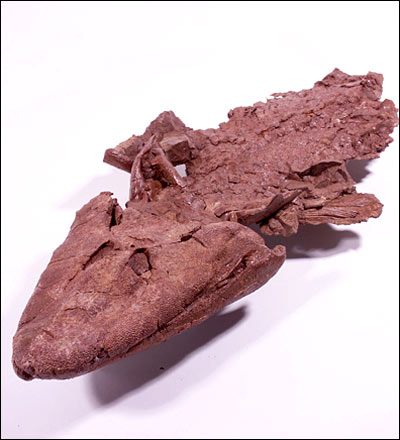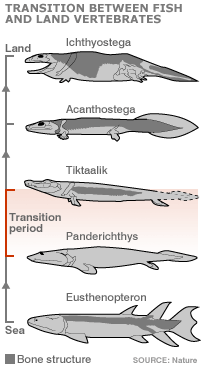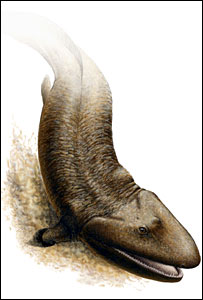
One of three newly-discovered specimens of the 383 million-year-old
Tiktaalik roseae.
These specimens fill a gap in the fossil record between aquatic and terrestrial animals.
Image: Ted Daeschler.
Making that transition from aquatic life to living on land was very important for vertebrates. However, there has been a gap in the fossil record at precisely that transitional point -- up until now, that is. Today, a group of scientists report that they found a group of three fossils from "crocodile-like" animals that neatly fit into the evolutionary progression as animals moved from water to land, causing many people to refer to them as the "missing link."
"We are capturing a very significant transition at a key moment of time. What is significant about the animal is that it is a fossil that blurs the distinction between two forms of life - between an animal that lives in water and an animal that lives on land," said palaeontologist, Neil Shubin, from the University of Chicago, who co-discovered the fossil with Edward Daeschler, from the Academy of Natural Sciences in Philadelphia.
 Based on evolutionary theory and an analysis of the fossil record, scientists predicted that a creature once existed that possessed a unique blend of piscine and crocodilian characteristics. But the fossil record had a gap at precisely this point between Panderichthys, a fish that shows the beginnings of several land-friendly features, and Acanthostega, the earliest known tetrapod (four-limbed
Based on evolutionary theory and an analysis of the fossil record, scientists predicted that a creature once existed that possessed a unique blend of piscine and crocodilian characteristics. But the fossil record had a gap at precisely this point between Panderichthys, a fish that shows the beginnings of several land-friendly features, and Acanthostega, the earliest known tetrapod (four-limbed land-dwelling animals). Panderichthys lived approximately 385 million years ago while the earliest Acanthostega fossils are about 365 million years old.
The newly described Tiktaalik roseae fits between these two forms (see figure, right). This new species has scales on its back and webbed fins like a fish, but it also has eyes located on the top of its flat crocodile-like head, suggesting that it lived in shallow water, and it has a short neck -- a characteristic that all fishes lack (see artist's representation below, left).
"When we look inside the fin, we see a shoulder, we see an elbow, and we see an early version of a wrist, which is very similar to that of all animals that also walk on land," noted Shubin.
 In 2004, the researchers found three nearly complete, well-preserved fossil skeletons of this new species in the Nunavut Territory, a region of the Canadian Arctic. The largest fossil is almost 3 meters (9 feet) long.
In 2004, the researchers found three nearly complete, well-preserved fossil skeletons of this new species in the Nunavut Territory, a region of the Canadian Arctic. The largest fossil is almost 3 meters (9 feet) long.
"This material is amazing because it includes a nearly complete skeleton -- which is always handy because instead of assembling the fossil from bits we can see the whole skeleton and be sure that this is how the animal was put together," commented Andrew Milner, a palaeontologist from the Natural History Museum, UK.
These findings will appear in this week's issue of the top-tier research journal, Nature. A cast of one of the fossils will be on display at the Science Museum in London beginning Thursday.
Thanks, Caren!
- Log in to post comments

This is really a terrific discovery. Although I must say I don't care for the cringworthy archaic term "missing link".
What does "bone structure" mean in the diagram - areas where the endoskeleton is composed of bone as opposed to cartilage?
Yes, you are correct, Alon.
See also on this here.
If a tetrapod is a "four-limbed land-dwelling animal", then shouldn't Acanthostega not count as one? Its limbs weren't set up to bear its weight on land; they were used for moving around in the water.
Found this originally on Pharyngula's blog.
Nice find. Even better that there are complete skeletons. Means there are absolutely no doubts whatsoever about this animal's morphology, other than the usual minor quibbles about soft tissue (i.e., did it have newt-like gill fronds that appeared externally, or were all of its respiratory tissues internal).
I now await with baited breath the IDers excuse for this ... probably something along the lines of "God planted it to deceive foolish evilutionists" ... an argument that fell flat on its face the first time it was tried in the 19th century with dinosaurs, but then the ignorant never seem to learn from their mistakes :)
Off topic- if you don't mind:)
I was referred to you by one of your commenters. My question:
"I'm wondering if you (or anyone else)know of discussion forums or blogs that're primarily on new research in evolutionary biology? That's what I'm looking for; I'm not so interested in reading about Intelligent Design/creationism all the time. It gets tedious.:)"
Thanks!